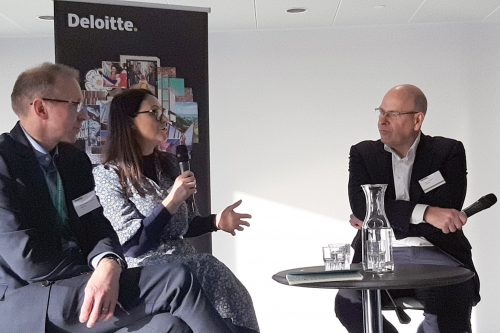Skills and sustainability drive Leeds growth

Leeds’ growth over the past 12 months has been driven by talent and delivery of sustainable living, Deloitte associate director Emma Gomersal said at the launch of the firm’s Leeds Crane Survey 2023 on Thursday morning.
“There’s a notable theme of innovation and new approaches to development being taken across all sectors within Leeds,” said Gomersal, presenting Deloitte’s analysis of the Crane Survey data it released earlier this week. “But what does innovation mean?
“In the context of what we’re discussing today we’ve looked at it as two core elements. We’ve got skills for the 21st century – by that I’m talking about talent retention, education and research, and workspace. And we’ve got sustainability – again, in the context of Leeds, I’m talking about connectivity, environmental greening, cultural enhancement, and the delivery of sustainable communities and neighbourhoods. All these areas performed really strongly in Leeds over the last year.”
While residential starts had dipped slightly – 5 starts, compared to an annual average of 5.5 starts – student residential starts had increased by 48% from the previous year, with 3,294 new beds. The University of Leeds had increased the number of students to 40,000 in 2021/22, up from 36,000 in 2019 and now close to capacity. Over the same period, Leeds Beckett University increased student numbers to 22,500 from 19,000.
Graduate retention rates increased to 35%, up from 29% in 2014/15 – a rise Deloitte attribute to great job opportunities within the city and growth in build-to-rent accomodation.
Five major public schemes aimed at increasing quality of living, including Aire Park and the Sustainable Travel Gateway, were under construction.
“While these are very strong headline results, we cannot take our foot off the gas, said Angela Barnicle, chief officer for asset management and regeneration at Leeds City Council said during a Q&A with Deloitte partner Simon Bedford.
“That persistence in the pursuit for more runs right through everything we do, which is why the innovation arc has come forward, why we’re looking to the next 10 years but really concentrating on what we’re doing the next 10 days at the same time.”
Ben Still, chief executive of West Yorkshire Combined Authority (WYCA), said West Yorkshire as a whole had three cities and two major towns that would be regional hubs in another part of the country, but Leeds’ importance to the economy of West Yorkshire and Yorkshire as a whole should not be understated.
WYCA, now the channel for funding from the Department for Transport, was focusing on better public transport, partly as a result of government directives to help reduce carbon footprints.
“That doesn’t mean it’s not investing in roads, that it’s not about schemes that are aiming to increase vehicle speeds, for example, it’s much more about the balance between public transport, walking and cycling and other active modes of transport, and the private vehicle.”
Later he clarified, “What we’re trying to achieve is the right balance between allowing fast strategic movement where it needs to be, point to point between the city centres, while balancing that with the needs particularly of the rail network, and with a lot of point-to-point journeys that are much more local.
“And in all transport systems that’s a really difficult balance to get right.”








